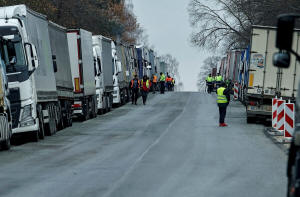|
The
truckers say they are losing out to Ukrainian companies which
offer cheaper prices for their services and which are now
transporting goods within the European Union, rather than just
between the bloc and Ukraine.
"I would like to end this protest as soon as possible, because
it is as burdensome for us as for everyone around us," said
Tomasz Borkowski, leader of the Committee to Protect
Transporters and Transport Employers, a Polish union.
"We have no intention of giving up and we will stand until we
get our terms."
Polish truckers have already been blocking access to three other
border crossings since Nov. 6, demanding that the European Union
reintroduce a permit system for Ukrainian truckers entering the
bloc and for EU truckers entering Ukraine, with exemptions for
humanitarian aid and military supplies.
The system was lifted after Russia invaded the country in 2022.
The truckers also want empty trucks from the European Union to
be excluded from an electronic queuing system in Ukraine and
measures to stop Belarusian and Russian hauliers setting up
companies in Poland to get around sanctions.
The current waiting time for trucks to cross at Medyka, one of
eight road border crossings with Ukraine, is 127 hours according
to data from the Polish border guard.
In Medyka truckers are joining a protest organized by farmers
who are demanding that government support to help them deal with
low grain prices be continued.
Two trucks per hour are being let through at Medyka, the
protesters say, with exemptions for humanitarian aid and war
supplies.
Ukraine says the protest is damaging its fragile war-time
economy by hampering exports and stopping supplies of essentials
like motor vehicle gas (LPG) from entering the country.
With Ukraine's Black Sea ports - a key export route before the
war - virtually blocked by Russia, Ukrainian businesses rely on
roads and railways to reroute exports and imports.
Ukraine's Infrastructure Ministry estimated that an average
40,000-50,000 trucks cross the border with Poland per month via
eight existing crossings, twice as many as before the war. Most
of the goods are carried by Ukraine's transport fleet.
(Reporting by Karol Badohal, writing by Alan Charlish, editing
by Susan Fenton)
[© 2023 Thomson Reuters. All rights
reserved.] Copyright 2022 Reuters. All rights reserved. This material may not be published,
broadcast, rewritten or redistributed.
Thompson Reuters is solely responsible for this content.

|
|




